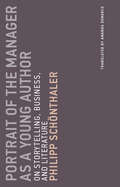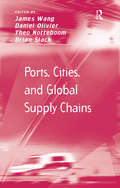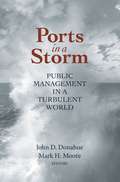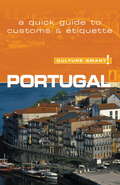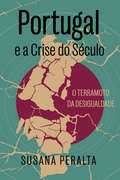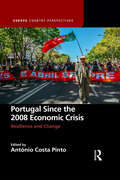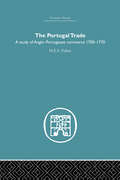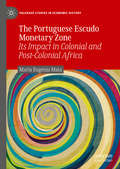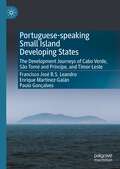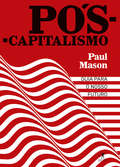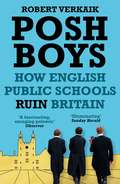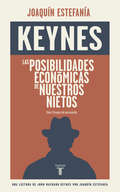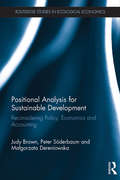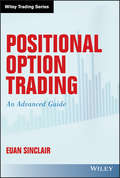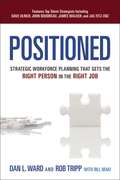- Table View
- List View
Porto Adriatico
by Arthur I SegelIn March 2012, Jack Dawkins is in the early stages of leading the development of an old navy yard in Croatia into a mixed-use waterfront community of residences, hotel rooms, shops and dining. Catering to those arriving by superyachts and other leisure boats, and set amongst dramatic coastline, the project would transform the region. Coordinating the many stakeholders in a new country, Jack has to decide the best way to navigate the development risks and whether the project really makes sense as proposed, in more ways than one.
Portrait of a Burger as a Young Calf: The True Story of One Man, Two Cows, and the Feeding of a Nation
by Peter LovenheimWhen Lovenheim's young daughter asks where hamburger comes from, he sets out to find a detailed answer to her question. He visits farms in New York state and buys two beef calves to follow through the beef production process. He presents a lot of information in a way which is clear and readable. He treats the farmers' actions and decision with respect and compassion even when he is dealing with the hard lives of the animals and their keepers. The author shares his own struggles concerning the slaughter of animals especially his own two cows. He interviews folks who revere cows and those who relish their best steaks. Excellent descriptions. Possibly a bleak subject, but definitely a captivating book.
Portrait of a Woman in Silk: Hidden Histories of the British Atlantic World
by Zara AnishanslinThrough the story of a portrait of a woman in a silk dress, historian Zara Anishanslin embarks on a fascinating journey, exploring and refining debates about the cultural history of the eighteenth-century British Atlantic world. While most scholarship on commodities focuses either on labor and production or on consumption and use, Anishanslin unifies both, examining the worlds of four identifiable people who produced, wore, and represented this object: a London weaver, one of early modern Britain's few women silk designers, a Philadelphia merchant's wife, and a New England painter. Blending macro and micro history with nuanced gender analysis, Anishanslin shows how making, buying, and using goods in the British Atlantic created an object-based community that tied its inhabitants together, while also allowing for different views of the Empire. Investigating a range of subjects including self-fashioning, identity, natural history, politics, and trade, Anishanslin makes major contributions both to the study of material culture and to our ongoing conversation about how to write history.
Portrait of the Manager as a Young Author: On Storytelling, Business, and Literature (Untimely Meditations #12)
by Philipp SchonthalerWhat happens to the relationship between business and literature when storytelling becomes a privileged form of communication for organizations. Corporations love a good story. Microsoft employs a chief storyteller, who heads a team of twenty-five corporate storytellers. IBM, Coca-Cola, and the World Bank are among other organizations that have worked with storytelling methods. And, of course, Steve Jobs was famous for his storytelling. Today, narrative is a privileged form of communication for organizations. In Portrait of the Manager as a Young Author, Philipp Schönthaler explains this unlikely alliance between business and storytelling. The contradictions are immediately apparent. If, as the philosopher Hans Blumenberg writes, stories are told to pass the time, managers would seem to have little time to spare. And yet, Schönthaler reports, stories are useful in handling complexity. When digital information flows too quickly and exceeds the capacity of the human brain, narrative can provide communicative efficiency and effectiveness. Words and numbers both vouch for truth, are both instrumentalized by management, and are inextricably interdependent. What happens, if narrative becomes ubiquitous? Does the commercialization of narratives have an effect on literature? Through the lens of storytelling, Schönthaler explores the relationship between economics and literature and describes a form of writing that takes place in their shared spheres. Most books on storytelling in the corporate world are written by business writers; this book offers the perspective of an award-winning literary author, who considers both the impact of storytelling on business and the impact of business on literature.
Portrait Pro
by Jeff SmithDroves of hobbyist photographers make a move to professional photography every year. They read a few books, watch rock star photographers shoot online, make business cards, and forge their path to a new career. When they book clients, work through the session, proof their images, and conduct a sales session, though, they encounter artistic, organizational, and financial problems they had not anticipated, and many stall out. In this book, Jeff Smith focuses on finding an audience and a target demographic, honing your posing and lighting skills, working with clients, and managing business and personnel concerns. Smith begins by taking a close look at the mind-set required for forging ahead as a professional photographer. He shows you how to define and target the clientele you want to work with and teaches you skillful approaches for creating and maintaining a strong photographer-client relationship. He notes that many photographers enter the business to create images that please them and explains that to be successful, photographers must instead learn to gain insight into just what the client wants to see in the final photos in order to maximize profits and keep clients coming back for more. With a clearly defined objective and approach outlines, Smith moves on to tackle common technical issues that new pros find daunting. He provides tips for creating perfect lighting in the studio and outdoors. He also discusses positioning for every part of the body, to create an ideal presentation to the camera. Next, he provides compositional tips-from where to position the subject in the frame, to selecting the best camera angle, to cropping for impact-in order to maximize image impact and present the best-possible image to your client. Finally, with the technical and artistic fields addressed, Smith turns to a discussion on the business side of the profession. He offers advice on acquiring equipment, understanding costs and pricing, creating new business opportunities, identifying an ideal studio location, and even managing your time.
Ports, Cities, and Global Supply Chains (Transport and Mobility)
by RoutledgeGlobal trends in policy and technology related fields are rapidly reshaping the port industry worldwide. International in scope, this volume provides multidisciplinary insights into the role port cities adopt in dealing with global supply chains. Throughout the book, concepts of strategic management, supply chain management, port and transport economics and economic and transport geography are applied to offer an in-depth understanding of the processes underlying global supply chains and associated spatial and functional dynamics in port-cities. The book also discusses policy outcomes and implications relevant to port-cities positioned in different segments of global supply chains.
Ports in a Storm
by John D. Donahue Mark H. MooreIn Ports in a Storm a team of Harvard Kennedy School scholars focus diverse conceptual lenses on a single high-stakes management task-enhancing port security across the United States. Their aims are two: to understand how a public manager might confront that complex undertaking, and to explore the similarities, differences, and complementarities of their alternative approaches to public management.The book takes as its pivot point the singular case of U.S. Coast Guard Captain Suzanne Englebert and her leadership of efforts to secure America's ports after the September 11 attacks. The Coast Guard had always been responsible for securing America's ports and coastline. But now it was tasked with safeguarding these critical, complex, and vulnerable assets during a time of war, a job it clearly could not handle alone. Ports in a Storm considers the monumental challenge of driving rapid change in a complex system involving hundreds of private organizations and scores of government agencies with their operations intricately intertwined. The book examines Englebert's actions from varied conceptual vantage points, sometimes critiquing questionable calls but more often celebrating her initiative, creativity, persistence, and skill.The authors use the Coast Guard episode as a testing ground for the eclectic intellectual constructs they have been developing to guide public managers. Instead of starting with theory and searching for examples that fit, they begin with the concrete and then harness scholarship to the service of better practice. And rather than mimic management principles from the business world, they tailor their approach to the very different challenges of managing in a public sector context. The volume allows readers in both the scholarly and practical worlds to see how the theories measure up.Contributors, including the two volume editors, are Robert D. Behn, John D. Donahue, Archon Fung, Stephen Goldsmith, Elaine Kamarck, Herman B. Leonard, Mark H. Moore, Malcolm K. Sparrow, Pamela Varley, and Richard Zeckhauser.
Ports in a Storm
by John D. Donahue Mark H. MooreIn Ports in a Storm a team of Harvard Kennedy School scholars focus diverse conceptual lenses on a single high-stakes management task--enhancing port security across the United States. Their aims are two: to understand how a public manager might confront that complex undertaking, and to explore the similarities, differences, and complementarities of their alternative approaches to public management.The book takes as its pivot point the singular case of U.S. Coast Guard Captain Suzanne Englebert and her leadership of efforts to secure America's ports after the September 11 attacks. The Coast Guard had always been responsible for securing America's ports and coastline. But now it was tasked with safeguarding these critical, complex, and vulnerable assets during a time of war, a job it clearly could not handle alone. Ports in a Storm considers the monumental challenge of driving rapid change in a complex system involving hundreds of private organizations and scores of government agencies with their operations intricately intertwined. The book examines Englebert's actions from varied conceptual vantage points, sometimes critiquing questionable calls but more often celebrating her initiative, creativity, persistence, and skill.The authors use the Coast Guard episode as a testing ground for the eclectic intellectual constructs they have been developing to guide public managers. Instead of starting with theory and searching for examples that fit, they begin with the concrete and then harness scholarship to the service of better practice. And rather than mimic management principles from the business world, they tailor their approach to the very different challenges of managing in a public sector context. The volume allows readers in both the scholarly and practical worlds to see how the theories measure up.Contributors, including the two volume editors, are Robert D. Behn, John D. Donahue, Archon Fung, Stephen Goldsmith, Elaine Kamarck, Herman B. Leonard, Mark H. Moore, Malcolm K. Sparrow, Pamela Varley, and Richard Zeckhauser.
Portugal: Financial Sector Assessment Program--Technical Note--Investor Protection, Disclosure, and Financial Literacy
by International Monetary FundA report from the International Monetary Fund.
Portugal: Can Socialism Survive?
by Richard H.K. Vietor Haviland Sheldahl-Thomason"In late 2017, Prime Minister António Costa of the Socialist Party had come to an agreement with the far left parties that allied with his government and approved a budget for 2018 that included increased government spending as well as a belief that the fiscal deficit would fall to a record low of 1.1% of GDP.1 The country had recently emerged from a bailout package imposed in 2011 following the global financial crisis, and had sustained positive growth and a decreased fiscal deficit in the years since. Indeed, citing 3% growth in the second quarter of 2017, the Wall Street Journal characterized Portugal as “the comeback kid.”2 While the country had suffered from low productivity and a lack of competitiveness before the crisis, many hoped that the structural reforms and fiscal balancing would let Portugal recoup what it had foregone in the years following the crisis. Costa’s government had so far baffled critics, as the coalition parties agreed to budgets that accomplished a lower fiscal deficit while partially undoing austerity measures and returning pensions and wages to pre-bailout levels."
Portugal - Culture Smart!: The Essential Guide to Customs & Culture
by Sandy Guedes de QueirozAvoid being offended, or worse offending Portugal locals, instead familiarise yourself with local customs and cultures by reading Culture Smart! Portugal. This handy, pocket-sized book will help you to ease your way into a different culture and will assist you in making sure you don't develop incorrect stereotypes. Good preparation can go a long way in readying yourself for your journey. Whether you are setting off to Portugal in order to travel, learn, work or relocate, Culture Smart! will provide you with a wealth of information on everything from climate, population, doing business, nightlife and so much more. Culture Smart! Portugal offers an in-depth insight to the customs and cultures of Portugal, an area where many other guidebooks only scratch the surface.
Portugal e a Crise do Século: O terramoto da desigualdade
by Susana PeraltaUm guia para entender a crise em que estamos prestes a mergulhar. Um manual para não nos afundarmos. Pela economista Susana Peralta. «Nenhuma economia está preparada para um choque destes. É como um gigantesco terramoto que assola o tecido económico e social. Mas há tecidos mais sólidos do que os outros para absorver as ondas de choque do terramoto. As nossas economias estavam mal preparadas para este choque. O tecido estava lasso.» Habituámo-nos a associar a palavra economia a números, alguns inescrutáveis para o cidadão comum. De tal forma que nos esquecemos que há pessoas por detrás dos números. Pessoas e vidas muito diversas no seu quotidiano, no local onde trabalham e moram, no que estudam, no que leem, na forma de usufruir dos momentos de lazer. Até nos seus sonhos e no futuro que idealizam e tentam construir. Uma parte dessa diversidade é boa e desejável, pois permite-nos fazer o que a nossa individualidade ditar para tentarmos ser felizes. Outra é negativa, já que resulta das colossais diferenças de oportunidades e poder com que cada um enfrenta a vida, criando desequilíbrios e desigualdades profundas no tecido social. Susana Peralta, reputada economista e professora de Economia, analisa o país e as pessoas no rebentar da maior crise global do século XXI: uma crise sanitária, económica e social sem precedentes e com consequências devastadoras, que nos obriga a um olhar crítico sobre o nosso passado, presente e futuro.
Portugal Since the 2008 Economic Crisis: Resilience and Change (Europa Country Perspectives)
by António Costa PintoPortuguese democracy is now celebrating its 50th anniversary. Portugal joined the European Union (EU) in 1986, but the enduring legacies of the country’s transition process from authoritarianism to democracy became apparent during the European sovereign debt crisis, when Portugal experienced its third bailout since the institutionalization of democratic government. Although the first decade after EU accession was one of slight growth and investment, Portugal’s economy has, in effect, been performing poorly since the beginning of the 21st century. Among the major changes in Portuga - as in much of Southern Europe - as a result of the ‘great recession’, was the emergence of important new actors, including populist parties, new social movements and the polarization of attitudes toward the EU. In some of these areas, the phrase ‘with the exception of Portugal’ was always present. This book explores the factors that might explain why this is no longer the case, presenting a global overview, with an interdisciplinary focus, of the processes of economic, social and political changes in Portuguese democracy since the 2008 economic crisis. The volume is accessible to a broad academic audience, with chapters examining economic, political, social and foreign policy issues, for scholars interested in an analysis of Portugal’s emergence from the economic crisis.
The Portugal Trade: A study of Anglo-Portugeuse Commerce 1700-1770
by H.E.S FisherHistorians have long considered the ways in which the expansion of English trade beyond Europe in the seventeenth and eighteenth centuries contributed to the growth of English overseas trade as a whole, and to the coming of the Industrial Revolution. Their concentration on trade between England and her own colonies has led them, however, to neglect the importance of trade with the Spanish and Portuguese colonies in the Americas. Dr Fisher’s examination of Anglo-Portuguese trade between 1700 and 1770, and of the commercial links between the English North American colonies and Portugal, thus gives a wider perspective to our knowledge of the English ‘Commercial Revolution’. This study, based on a wide range of primary sources in England and Portugal, analyses the impressive growth of English trade with Portugal to 1760 and its subsequent decline in the 1760s, particular attention being given to the role of the Brazilian market and Brazilian gold-mining in these movements. The business practice of the merchants engaged in the principal constituent branches of the trade—textiles, foodstuffs, wines, and gold—is made clear and compared, while the characteristic instability of international commerce is borne out in the examination of the seasonal and yearly fluctuations which took place. On a more general level, the concluding chapter explores the relationship between the Portugal trade and the development of the English economy during this period. This book was first published in 1971.
The Portuguese Escudo Monetary Zone: Its Impact in Colonial and Post-Colonial Africa (Palgrave Studies in Economic History)
by Maria Eugénia MataThis monograph examines the failure of the Portuguese Escudo Monetary Zone and the birth of new monetary and financial systems in Portuguese-speaking African countries. Examining colonial and post-colonial times, Mata analyses the decision to build a Portuguese monetary area in the early 1960s and mid-1970s when the decolonisation process was peaking.This book offers some important lessons regarding the functioning and dismantling of monetary areas, and on the importance of central-banks’ co-operation.
Portuguese-speaking Small Island Developing States: The Development Journeys of Cabo Verde, São Tomé and Príncipe, and Timor-Leste
by Francisco José Leandro Enrique Martínez-Galán Paulo GonçalvesThis book assesses the dynamics, challenges and achievements of the development processes of three Portuguese-speaking Small Island Developing States (PSSIDS) - Cabo Verde, São Tome and Príncipe, and Timor-Leste. Important lessons are drawn from those processes, which are relevant for policymakers, as well as for their bilateral and multilateral development partners, including international organizations such as United Nations or the Community of Portuguese Language Countries. To that end, the book includes contributions to the academic literature about SIDS, an area of research that has been significantly overlooked. The conclusions would be of interest to readers as a lead up to the fiftieth anniversary of their independence.
Poruliyal Kotpaadu (Economic Theory) 12th Standard - Tamilnadu Board
by State Council of Educational Research TrainingPoruliyal Kotpaadu (Economic Theory) Textbook for the 12th Standard Students, preparing for Tamil Nadu State Board Exam.
Pós-capitalismo
by Paul MasonUm guia para o nosso futuro. «Será utópico acreditar que estamos à beira de uma evolução e de uma alternativa ao capitalismo? (...) Porque será que nos custa tanto imaginar uma liberdade económica?» Ao longo dos últimos dois séculos, o capitalismo reinventou-se continuamente, intercalando ciclos de pujante crescimento com momentos de gravosa recessão. De todas as vezes, o sistema sobreviveu às crises e emergiu dos escombros - sempre renovado, sempre mais forte. Mas isso acabou. O capitalismo atingiu o seu limite. Paul Mason leva-nos numa incrível viagem pela turbulenta história do capitalismo para demonstrar como este imenso e complexo organismo financeiro e social deixou de conseguir adaptar-se às mudanças que estão em curso. Falamos das novas tecnologias de informação e de uma revolução profunda no modo de encarar o trabalho e as formas de produção; uma mudança irreversível no valor do trabalho e de quem o faz. E será esta mudança de paradigma a responsável pela destruição das antigas (embora ainda vigentes) concepções de economia de mercado e propriedade privada, os fundamentos do próprio sistema. O capitalismo é um sistema falido, incapaz de encontrar soluções viáveis para as crises que o têm atingido. Mas a alternativa existe e está em marcha. E trará uma sociedade mais justa e igualitária e uma economia mais sustentável. Chama-se pós-capitalismo. «A tese acerca do pós-capitalismo merece ser amplamente lida, tanto pela direita como pela esquerda. Políticos de todas as cores devem tirar notas, bem como quem votou neles.» Financial Times «Pós-Capitalismo é mais que um tratado ou uma descrição do que está a acontecer-nos a todos. Assume-se como um serviço intelectual e espiritual fundamental para a Humanidade e como um sistema de navegação para este mundo novo que se desvela à nossa frente. É, ao mesmo tempo, um trabalho visionário e histórico, e o melhor livro sobre economia e sociedade a ser publicado no meu tempo de vida.» Irvine Welsh «Mason é um grande e eloquente polemista e admiro-lhe a ambição de escrever este livro. Reescrever Marx é bastante ambicioso, certo?» The Independent «Profundamente interessante... Mason coloca as questões mais pertinentes, sem medo das respostas. Além disso, escreve com grande vivacidade e perspicácia. Não me lembro do último livro que li que tivesse conseguido penetrar de forma tão enérgica na floresta das ideias políticas e económicas. (...) Mason é um sucessor de Marx à altura.» David Runciman «Depois do pós-modernismo e de outras pós-modas, Mason confronta-nos com o único e verdadeiro pós: o pós-capitalismo. Embora todos percebamos à nossa volta os sinais agoirentos de um impasse do capitalismo global, é-nos mais difícil do que nunca conceber uma alternativa exequível ao mesmo. Como poderemos lidar com tamanha frustração? O livro de Mason é uma leitura irresistível, mas esta clarividência não deverá distrair-nos: este é um livro que nos obriga a pensar!» Slavoj Zizek «Um diagnóstico radical e um prognóstico arrojado, que irá sem dúvida motivar os mais progressistas.» Kirkus Reviews «Irá, decididamente, provocar acesos debates - e é precisamente de debates desses que precisamos.» Naomi Klein
Poseidon Carlsbad: Desalination and the San Diego County Water Authority
by John D. MacomberExtreme drought conditions in California have significant impacts on the ability of the San Diego County Water Authority to provide adequate water for current users. Water shortfalls also could curtail the economic development of one of the fastest growing regions in America. Seawater desalination is expensive and energy intensive, but it could be a partial solution. Brian Brady and other members of the Authority need to vote for or against a financing and construction plan that includes a 30-year water purchase agreement with Poseidon Resources (Channelside) LP, a private company. In the early years the cost of water would be almost double the average unit cost the Authority pays at the time of the decision. Is this proposal good policy in the long run to lock in supply and price for 7% of the region's water needs? Is the private finance and provision of public infrastructure appropriate for a basic good like water? The case also investigates the allocation of water supply and usage in California and the environmental impacts of running this plant on electricity drawn from the local utility, which in San Diego County is about 65% from fossil sources. The case is intended to be used as an introduction to water policy, seawater desalination, bond finance and cash flow waterfalls, infrastructure as a foundation for economic development, and risk allocation in public-private partnerships.
Posh Boys: How English Public Schools Ruin Britain
by Robert Verkaik&‘The latest in the series of powerful books on the divisions in modern Britain, and will take its place on many bookshelves beside Reni Eddo-Lodge&’s Why I&’m No Longer Talking to White People About Race and Owen Jones&’s Chavs.&’ –Andrew Marr, Sunday Times &‘In his fascinating, enraging polemic, Verkaik touches on one of the strangest aspects of the elite schools and their product&’s domination of public life for two and a half centuries: the acquiescence of everyone else.&’ –Observer In Britain today, the government, judiciary and military are all led by an elite who attended private school. Under their watch, our society has become increasingly divided and the gap between rich and poor is now greater than ever before. Is this the country we want to live in? If we care about inequality, we have to talk about public schools. Robert Verkaik issues a searing indictment of the system originally intended to educate the most underprivileged Britons, and outlines how, through meaningful reform, we can finally make society fairer for all.
Las posibilidades económicas de nuestros nietos
by John Maynard KeynesPor primera vez, la obra de John Maynard Keynes, el economista más influyente del siglo XX, puesta a disposición del gran público. Sin duda hoy la mayoría de los ciudadanos cree en el poder de los gobiernos y de las intervenciones públicas a la hora de evitar las depresiones, el desempleo masivo y el empobrecimiento. Sin embargo, prácticamente nadie sabe que esta idea, y su correspondiente desarrollo técnico, es de John Maynard Keynes, uno de los padres de la economía como ciencia, y probablemente el economista más citado, cuya obra, sin embargo, es para muchos desconocida. Más de seis décadas después de su muerte, ¿qué queda de él y del keynesianismo? Para responder a esta pregunta, Joaquín Estefanía rescata, de sus Ensayos de persuasión, los textos de mayor calado político, accesibles a cualquier lector y enormemente representativos de la vigencia de Keynes. En su amplia introducción a los siete ensayos que conforman la segunda parte de este libro, de impresionante actualidad en el siglo XXI, Joaquín Estefanía analiza en qué medida Keynes y su obra siguen siendo guías para el futuro. La lúcida semblanza que hace del creador de la macroeconomía retrata a éste como un pensador clave y contracorriente: «Keynes rechaza frontalmente el comunismo, no le gustan ni el conservadurismo ni el laborismo de su época, y cree que hay que hacer algo». Reseña:«Joaquín Estefanía y su relectura amena y estimulante de los textos más asequibles y certeros de John Maynard Keynes.»Josep María Ureta, El Periódico de Catalunya «Magistral crónica de las ideas, muy bien escrita, que contagia rápidamente al lector.»Alternativas económicas
Posicionando Conteúdo no Google em 3 Passos
by Álvaro CidTenho comparado este método com minha forma de fazer as coisas antes e depois e tenho rankeado muito mais alto, atraindo muito mais visitas a meu site web. E graças a este método, tenho poupando tempo, esforço e energia. Ao padronizar tudo, posso me concentrar mais no meu leitor. Muitas pessoas gostariam de ser capazes de posicionar-se no Google com sua página de web ou blog. O problema, é que realmente não sabem como fazer. Inclusive algumas pessoas têm tentado posicionar-se com alguns artigos ou conteúdo, mas sem nenhum resultado. Esse é o momento em que os amadores abandonam. Infelizmente, nenhum deles nunca conseguiram posicionar um artigo corretamente. Este manual irá de ajudar a posicionar os seus conteúdos no menor tempo possível e seguindo as melhores práticas do Google. Tenho desenvolvido este método com base nas minhas experiências nos meus conhecimentos e em resultados que tenho obtido. Este método foi desenvolvido para qualquer um, com ou sem experiência, para que possa posicionar seus conteúdos de maneira correta alcançando uma boa posição o mais rápido possível. Os passos a seguir seram rápidos e intuitivos, qualquer um pode seguir e se o seguem estaram em melhor posição que a concorrência em termos de conteúdo dos seu posicionamentos: *Você terá um método efetivo e replicável em cada um de seus conteúdos. *Você conseguirá analizar as tendências e se posicionar frente a concorrência. *Você melhorará seu conteúdo a os olhos do Google e especialmente para seus leitores *Você terá um aumento em sua marca pessoal e seu posicionamento online. *Este último irá permitir o ganho de possivéis relacionamentos de trabalho e oportunidades de negócios
Positional Analysis for Sustainable Development: Reconsidering Policy, Economics and Accounting (Routledge Studies in Ecological Economics)
by Judy Brown Peter Soderbaum Malgorzata DereniowskaClimate change, biodiversity loss, pollution of land and water, land-use changes, lack of equality and other problems at local, national and global levels represent a challenge for economics as a social science. Mainstream neoclassical economics may be able to contribute to a more sustainable society but it has also played a dominant role in a period where problems have been aggravated. A pluralist and democratic view of economics is therefore very much warranted. This book presents a multidimensional and ideologically more open view of economics: understanding economics in multidimensional terms is in accordance with the 17 sustainable development goals recognized by nations at the UN-level in 2015. Accordingly, approaches to decision making and accounting at the national- and business levels have to be reconsidered. Neoclassical Cost-Benefit Analysis (CBA) with focus on the monetary dimension and an assumed consensus about a specific market ideology to be applied is not compatible with democratic societies where citizen and actors in other roles normally differ with respect to ideological orientation. Environmental Impact Statements and Multi-Criteria methods are used to some extent to broaden approaches to decision-making. In this book, Positional Analysis is advocated as a multidimensional and ideologically open approach. Positional Analysis is based on a political economic conceptual framework (as part of ecological economics) that differs from neoclassical ideas of individuals, firms and markets. And since approaches to decision-making and to accounting are closely connected, a new theoretical perspective in economics similarly raises issues of how national and business accounting can be opened up to meet present demands among various actors in society. This perspective raises also numerous ethical questions at the science and policy interface that need to be properly addressed for sustainability decision making.
Positional Option Trading: An Advanced Guide (Wiley Trading)
by Euan SinclairA detailed, one-stop guide for experienced options traders Positional Option Trading is a rigorous, professional-level guide on sophisticated techniques from professional trader and quantitative analyst Euan Sinclair. The author has over two decades of high-level option trading experience. He has written this book specifically for professional options traders who have outgrown more basic trading techniques and are searching for in-depth information suitable for advanced trading. Custom-tailored to respond to the volatile option trading environment, this expert guide stresses the importance of finding a valid edge in situations where risk is usually overwhelmed by uncertainty and unknowability. Using examples of edges such as the volatility premium, term-structure premia and earnings effects, the author shows how to find valid trading ideas and details the decision process for choosing an option structure that best exploits the advantage. Advanced topics include a quantitative approach for directionally trading options, the robustness of the Black Scholes Merton model, trade sizing for option portfolios, robust risk management and more. This book: Provides advanced trading techniques for experienced professional traders Addresses the need for in-depth, quantitative information that more general, intro-level options trading books do not provide Helps readers to master their craft and improve their performance Includes advanced risk management methods in option trading No matter the market conditions, Positional Option Trading is an important resource for any professional or advanced options trader.
Positioned: Strategic Workforce Planning That Gets the Right Person in the Right Job
by Dan L. Ward Rob Tripp Bill MakiFrom the C-suite to the sales force to the ground floor, downtime is deadly. When a job opens or turns over, organizations must adjust seamlessly. In Positioned, some of the world's best people strategists examine how best to address the constant challenge of having the right people available when needed. Thought leaders including Dave Ulrich, John Boudreau, James Walker, Jac Fitz-enz, Peter Howes, Dan Hilbert, and Naomi Stanford weigh in on the future of strategic staffing, virtual workplaces, disruptive technologies, globalization, and what practices will - and will not - help organizations thrive. Positioned captures the best workforce planning practices from leading organizations such as Boeing, HP, the U. S. Intelligence Community, and others in the private and public sectors. The book's Analytics section examines the evolution of workforce analytics and the roles of HR professionals and consultants. In an era of globally increasing complexity and competition for talent, shortages and misalignment can derail an organization's effectiveness. This book helps them get back on track.



